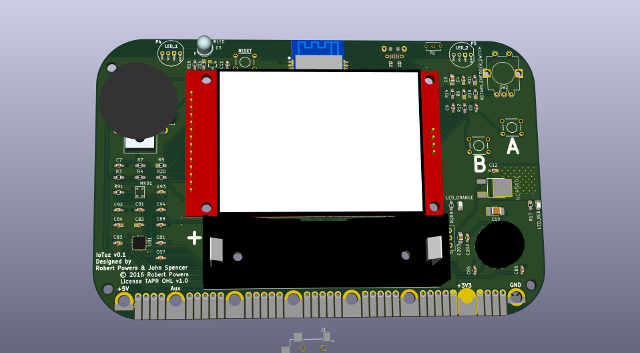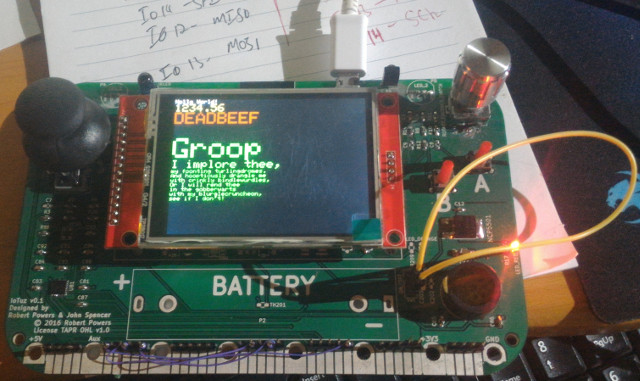OHC2017
To improve diversity and better representation, we have allocated 3 additional OHMC places for women attending LCA2017 (2 of 3 left). The OHMC is intended for technically inclined people of *all* skills levels and experience, particularly software developers who'd like to jump into the world of internet connected hardware devices. The ESP32 has only just become available and will be a game-changer due to its capabilities (Wi-Fi, Bluetooth, more CPU, more memory, more I/O), open-source operating system and low-price. Embedded C isn't your only option, there will be a presentation on microPython as well. Come join us for a fun day of hacking ---> Registration
Registrations now partially WAIT-LISTED (see above) for the Open Hardware Miniconf 2017
The Open Hardware Miniconf 2017 will take place as part of LCA 2017 in Hobart, Tasmania, Australia.
The concept of Free / Open Source Software, already well understood by LCA attendees, is complemented by a rapidly growing community focused around Open Hardware and "maker culture". One of the drivers of the popularity of the Open Hardware community is easy access to cheap devices such as Arduino, which is a microcontroller development board originally intended for classroom use but now a popular building block in all sorts of weird and wonderful hobbyist and professional projects.
Interest in Open Hardware is high among FOSS enthusiasts but there is also a barrier to entry with the perceived difficulty and dangers of dealing with hot soldering irons, unknown components and unfamiliar naming schemes. The miniconf will use an Open Hardware assembly project as a stepping stone to help ease software developers into dealing with Open Hardware. Topics will cover both software and hardware issues, starting with simpler sessions suitable for Open Hardware beginners and progressing through to more advanced topics.
The day will run in two distinct halves. The first part of the day will be a hands-on assembly session where participants will have the chance to assemble a special hardware project developed for the miniconf. Instructors will be on hand to assist with soldering and the other mysteries of hardware assembly. The second part of the day will be presentations about Open Hardware topics, including information on software to run on the hardware project built earlier in the day. Due to the nature of the hardware project, we will be spending more time on presentations about the IoTuz hardware, software and getting the most out of it.
Contents
Venue
We are pleased to announce that we'll be running OHMC2017 in the Welliington room at Wrestpoint.
Schedule
To be announced in detail shortly.
Date: Tuesday 17th January 2017
- 10:40 - 12:20 Assembly workshop (registration required to participate, spectators also welcome)
- 12:20 - 1:20 Lunch
- 1:20 - 3:00 Assembly workshop continued, Talks
- 3:00 - 3:40 Afternoon Tea
- 3:40 - 5:20 Talks and finishing off with lightning talks
Usual format for the OpenHardware MiniConf (Construction in the morning followed by talks in the afternoon) is expected.
Lightning Talks
- If you'd like to present a 5 minute lightning talk, please email andyg@geekscape.org
Call For Papers
Call For Papers is now open.
Please see OHC2017-CFP for more information
Call For Papers closes at midnight 31st December 2016
Accepted Papers
To be announced.
Discussion Group
There is a Google Group email list for discussion of topics related to the miniconf, including the assembly session:
https://groups.google.com/forum/#!forum/open-hardware-conf
Assembly Project
Each year we help attendees build a project specially developed for the Open Hardware Miniconf.
The project this year is called IoTuz -The Internet of Tux
The board is based around the ESP32, which is the big brother successor to the ESP8266 used in the ESPlant project in 2016. Hack-A-Day article describing the ESP32.
Estimated cost of the kit is AU$120.
Through hole parts on the board will be assembled on the day, with all the SMD parts being pre-loaded on the board.
Repository for the project is on Github: https://github.com/CCHS-Melbourne/IoTuz
The hardware kit includes ...
- ESP-WROOM-32 module
- 320 x 240 colour touchscreen
- Joystick, rotary encoder (knob), buttons
- 2x APA106 RGB LEDs (10 mm)
- 3 axis accelerometer
- Barometric pressure sensor
- InfraRed transmitter / receiver
- Audio circuit and speaker
- LiPo battery and charge circuit
- Easy access to IO pins .. alligator clip friendly
Project (im)maturity
Regardless of your current level of experience and skill ... you will have an excellent day and walk away with working hardware and software. If you want to get in at the ground floor of the ESP32 developer community, then this is a great place to start. There will be some uncharted territory, some trail blazing and plenty of learning from our mistakes :)
The hardware was initially tested by a short run of 4 prototype PCBs. Problems found were corrected for the production run. All the basics should work ... however, there is a chance that some modest hacking might be required, e.g cutting a track and adding wires.
The ESP32 is very new and modules have only been available in very small quantities to select groups of people for a couple of months. EspressIf have been working (transparently via GitHub) on the RTOS, networking stack and peripheral drivers ... and the basics work, but there is much more work to do.
Image 1. Rendered version of the board.
Image 2. Working prototype (missing battery holder).

